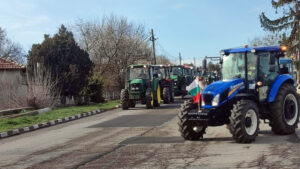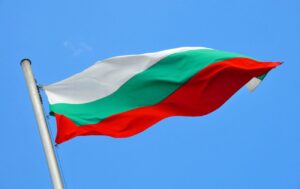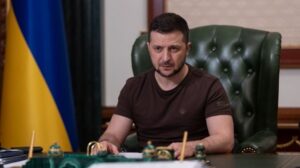
Farmers in Romania and Bulgaria staged protests Friday against the European Union’s decision to exempt agricultural products from Ukraine from duties, which ended up oversaturating local markets and contributing to lower prices, the Associated Press (AP) reported Friday.
“Farmers in Romania and Bulgaria staged protests Friday over the European Union’s stance on excessive supplies of Ukrainian agricultural products that have flooded local markets and weakened prices,” AP reported.
Protests took place in Bucharest and other Romanian cities. In Bulgaria, farmers blocked several border points.
“The new harvest is less than three months away and there is a danger that produce cannot be sold above the production price,” AP quoted Liliana Peron, executive director of the Romanian Farmers’ Association, as saying.
Polish farmers have also protested in recent weeks over duty-free supplies of Ukrainian grain to European markets adopted by the EU, forcing the country’s Agriculture Minister Henrik Kowalczyk to resign.
Last year, the EU abolished customs tariffs for Ukraine for freer grain shipments.
On Monday, the European Commission said it wanted to help the Ukrainian population by organizing the export of Ukrainian grain, but it is making sure that the EU market is not hit too hard by Kiev’s support measures.

Leaders of five Central and Eastern European countries have urged the European Commission to take action in connection with a surplus of grain and other Ukrainian food on their territory, the Associated Press reported from Warsaw.
“We call on the European Commission to study the possibility of buying accumulated grain from EU member states bordering Ukraine for humanitarian needs,” reads a letter addressed to EC President Ursula von der Leyen on behalf of the prime ministers of Poland, Slovakia, Hungary, Romania and Bulgaria.
“We also reiterate our call for financial support from the EU to accelerate the development of transport infrastructure (for the export of grain – IF),” it says.
It is pointed out that such products remain on the shelves of these countries in excess, reducing prices, and do not reach the countries that are ready to buy them outside the EU.
The European Commission earlier said that it intended to quickly launch an assistance mechanism for countries that faced an influx of Ukrainian products.

A logistical operation to send military and military-technical aid to Ukraine began Friday, Dec. 23, according to the Bulgarian Defense Ministry’s press service.
“Starting today, a logistic operation will be carried out in which the aid approved by the National Assembly will be sent to Ukraine,” said Deputy Defense Minister Ekaterina Gramatikova.
In turn, the country’s defense chief Admiral Emil Eftimov said that the course of negotiations or the provision of military assistance must remain confidential.
“Learned conclusions about the course of hostilities in Ukraine – not only on the basis of the tactics and equipment used, but also the logistics system, the state and capabilities of the DIC in both our country and NATO and EU allies. On this basis, we proposed a certain set of weapons and equipment,” he said.

President of Ukraine Volodymyr Zelensky, by his decrees dated December 23, replaced the ambassadors of Ukraine to the Republic of Bulgaria and the Republic of Latvia.
By decree No. 879/2022, the head of state dismissed Vitaliy Moskalenko from the post of Ambassador of Ukraine to Bulgaria and by decree No. 880/2022 appointed Olesia Ilaschuk to this post.
Also, by decree No. 881/2022, Zelensky dismissed Oleksandr Mischenko from the post of ambassador to Latvia.
“To appoint Anatoliy Kutsevol as Ambassador Extraordinary and Plenipotentiary of Ukraine to the Republic of Latvia,” decree No. 882/2022 says.

The ninth package of EU sanctions against Russia adopted on Friday allows Bulgaria, Hungary and Slovakia, which received a reprieve from the European Union’s oil embargo on Russian oil, to export oil products produced from it to Ukraine.
The EU Council resolution published in the EU Official Journal on December 16 says the decision “allows Hungary, Slovakia and Bulgaria to export to Ukraine certain refined products derived from Russian crude oil imported on the basis of the considered derogations (from the embargo – IF), including, if necessary, by transit through other member states.”
Another paragraph of the ruling allows Bulgaria to “export to third countries certain petroleum products derived from Russian crude oil imported on the basis of the derogations under consideration.
The publication attributes this to the need to “reduce environmental and safety risks, as such products cannot be safely stored in Bulgaria.
The document specifies that the respective annual exports should not exceed the average annual volume of exports of such products for the last five years.

Bulgaria’s parliament on Friday approved a list of weapons that will be sent to Ukraine as aid for the first time since the full-scale Russian invasion, Reuters reported.
“The weapons list is classified, but government officials said Sofia will send mainly light weapons and ammunition,” the report said.
A total of 148 deputies from the 240-member parliament voted in favor of sending aid Friday, while the Socialists and the pro-Russian Revival Party voted against it.
Acting Defense Minister Dimitar Stoyanov said Bulgaria, a NATO member, could not afford to send its Russian-made surface-to-air missile systems or the MiG-19 and Su-25 fighters Kiev needs.
“My approach was conservative because I need to ensure Bulgaria’s defense capability. The aid is fully in line with Ukraine’s priorities, but we are not sending S-300 systems or MiG-29 or Su-25 aircraft,” Stoyanov told Nova TV in a commentary.
Bulgaria has reportedly not previously sent weapons to Ukraine, but its arms manufacturers have seen a sharp increase in exports, a November report from the Bulgarian Industrial Association showed. In August, the Ministry of Economy approved arms export deals worth more than 1 billion leva ($540.22 million), most of which were destined for Poland, one of the key hubs for sending weapons to Ukraine.
According to Reuters, Bulgaria was one of the few EU countries that did not send aid to Ukraine after the Russia-friendly Socialist Party, a coalition partner in the previous government, blocked a previous proposal in May.